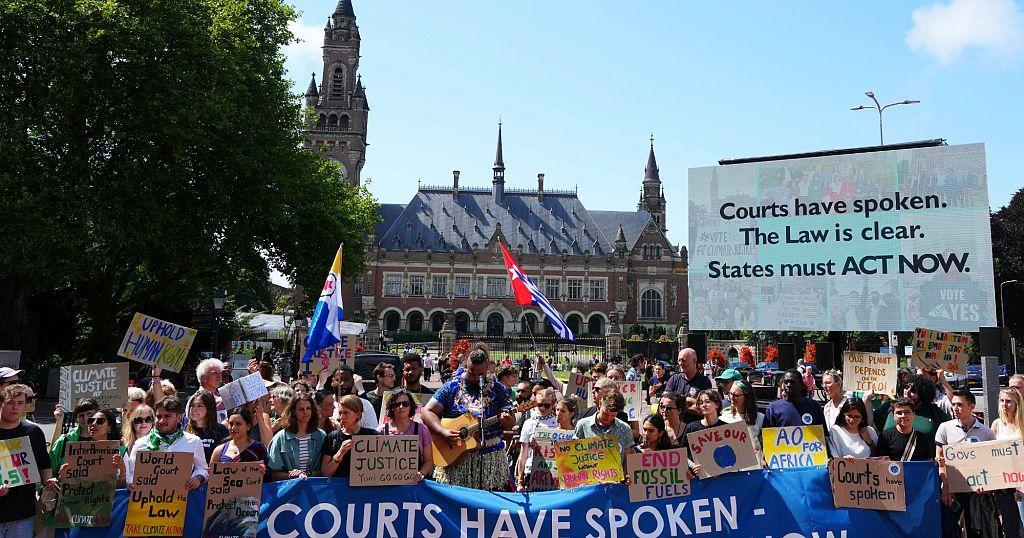Africa-Press – Eritrea. The United Nation’s top court says failing to protect the planet from climate change could violate international law.
Nations failing to tackle climate change could violate international law, the United Nations’ top court said on Wednesday, and the consequences could be expensive.
In a landmark advisory opinion, the International Court of Justice in the Hague found that countries harmed by other nations’ failure to protect the planet could be entitled to reparations.
Climate activists cheered the non-binding opinion and welcomed the courts’ statement that a “clean, healthy and sustainable environment” is a human right.
The case was led by the Pacific island nation of Vanuatu and backed by more than 130 countries.
After years of lobbying by vulnerable island nations who fear they could disappear under rising sea waters, the UN General Assembly asked the ICJ in 2023 for an advisory opinion, an important basis for international obligations.
A panel of 15 judges was tasked with answering two questions: What are countries obliged to do under international law to protect the climate and environment from human-caused greenhouse gas emissions? Second, what are the legal consequences for governments when their acts, or lack of action, have significantly harmed the climate and environment?
‘States must act’
Climate activists had gathered outside the packed court with a banner that read: “Courts have spoken. The law is clear. States must ACT NOW.” Afterward, others emerged laughing and hugging.
“Today, the tables have turned. The world’s highest court provided us with a powerful new tool to protect people from the devastating impacts of the climate crisis — and to deliver justice for the harm their emissions have already caused,” former UN human rights chief Mary Robinson said in a statement.
“The ICJ’s decision brings us closer to a world where governments can no longer turn a blind eye to their legal responsibilities. It affirms a simple truth of climate justice: Those who did the least to fuel this crisis deserve protection, reparations, and a future,” said Vishal Prasad, director of Pacific Islands Students Fighting Climate Change.
Activists could bring lawsuits against their own countries for failing to comply with the decision.
“What makes this case so important is that it addresses the past, present, and future of climate action. It’s not just about future targets — it also tackles historical responsibility, because we cannot solve the climate crisis without confronting its roots,” Joie Chowdhury, a senior attorney at the Center for International Environmental Law, told AP.
High stakes
“The stakes could not be higher. The survival of my people and so many others is on the line,” Arnold Kiel Loughman, attorney general of the island nation of Vanuatu, told the court during hearings in December.
In the decade up to 2023, sea levels rose by a global average of around 4.3 centimeters, with parts of the Pacific rising higher still. The world has also warmed 1.3 degrees Celsius since preindustrial times because of the burning of fossil fuels.
“The agreements being made at an international level between states are not moving fast enough,” Ralph Regenvanu, Vanuatu’s minister for climate change, told the Associated Press.
All UN member states including major greenhouse gas emitters like the United States and China are parties to the court.
The United States and Russia, both of whom are major petroleum-producing states, are staunchly opposed to the court mandating emissions reductions.
But those who cling to fossil fuels could go broke doing it, the UN secretary-general told The Associated Press this week.
Simply having the court issue an opinion is the latest in a series of legal victories for the small island nations. Earlier this month, the Inter-American Court of Human Rights found that countries have a legal duty not only to avoid environmental harm but also to protect and restore ecosystems. Last year, the European Court of Human Rights ruled that countries must better protect their people from the consequences of climate change.
In 2019, the Netherlands’ Supreme court handed down the first major legal win for climate activists when judges ruled that protection from the potentially devastating effects of climate change was a human right and that the government has a duty to protect its citizens.
The presiding judge on Wednesday acknowledged that international law had “an important but ultimately limited role in resolving this problem,” and said a lasting solution will need the contribution of all fields of human knowledge “to secure a future for ourselves and those who are yet to come.”
For More News And Analysis About Eritrea Follow Africa-Press







